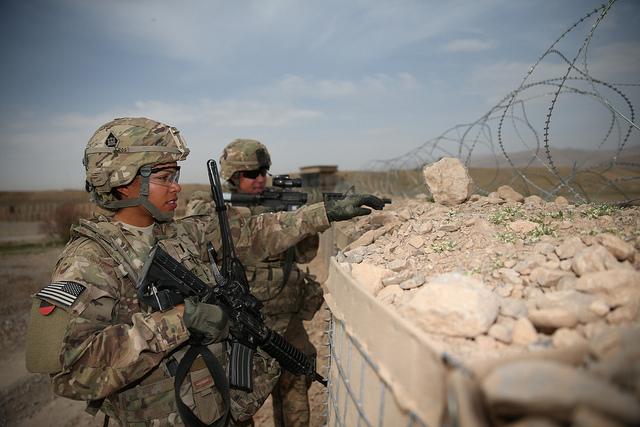
With International Women’s Day yesterday this week’s Land Warfare tips its hat to women in the US army and former CIA spy Betty McIntosh, and then looks at Boko Haram, US military power, the offensive in Tikrit and a (graphic) insight into mindset of Russian soldiers fighting in the Ukrainian conflict.
In the lead up to the US military’s plan to open all combat roles to women by 2016, six women have passed the Ranger Training assessment course and are set to attend Ranger school this April. Major-General Scott Miller says ‘any time any soldier will raise their hand for a voluntary course, particularly one that’s very, very tough, I admire those soldiers’.
Unfortunately, women who do graduate from the Ranger Course next month won’t be eligible for assignment to the 75th Ranger Regiment, as it remains closed to women. But with 4,100 previously ‘men only’ positions opening to women in the National Guard, regular Army and Army reserve, perhaps it’s simply a matter of time. The integration of women into combat roles has also prompted further research by the Army into the most effective measures and standards for testing a soldier’s fitness and capabilities in training in order to better match soldiers to their roles.
Former WWII spy Elizabeth ‘Betty’ McIntosh turned 100 last week, with CIA Director John Brennan hosting a special celebration. The agency also featured a commemorative story about her life and achievements. Brennan said that ‘it is fitting that Women’s History Month begins each year on [her birthday]’as ‘her many achievements and storied life are an inspiration to all women’.
The Islamic State (IS) franchise continues to grow and challenge al-Qaeda. In an unverified message released via Twitter over the weekend, Islamic terrorist group Boko Haram’s leader Abubakar Shekau pledged allegiance to the Islamic State. Daveed Gartenstein-Ross says that the primary advantages for Boko Haram are financial gain and ‘access to the group’s ‘propaganda apparatus.’ But ultimately Gartenstein-Ross believes that it won’t spur direct military intervention. Aaron Zelin from the Washington Institute likened the pledge to saying ‘We are on the same page’ but stressed that it’s ‘too early to tell if Boko Haram will fall directly under ISIS command, and to what extent they will act as an ISIS proxy.’
Unfortunately the news does reinforce fears that IS is moving beyond its current base in Syria and Iraq. Those fears may soon see a rush for American and allied forces to train African counterterrorism troops to combat extremism on the African continent.
Michael Noonan from the Foreign Policy Research Institute has written an important commentary at War on the Rocks on the attractiveness of special operations forces. He warns that no matter how ‘sexy’ SOF is made to look in films such as American Sniper, it should be utilised only when circumstances dictate and not because politicians and the public are seduced by its attractiveness.
In the Middle East, the ground force operation to reclaim the Iraq city of Tikrit has been underway for almost nine days. The operation comprises about 30,000 fighters, of whom roughly half are said to be Iraqi military. The other half appears to comprise 2,000 Sunni tribal fighters and 13,000 Shiite military forces accompanied by their Iranian sponsors and advisers. The overwhelming numbers of Iranian backed Shiite militia forces has sparked concern over the future safety of locals in the area, as it’s primarily a Sunni region.
In contrast to the impressive contributions of Shiite combatants, there’ve been questions on the capability of Iraq governance at this critical time. Over the weekend General Dempsey stated during a press conference that US advisors in the Middle East are ‘waiting for some of the Iraq units to show up, and when they’ve shown up they’ve shown up understrength and sometimes without the proper equipment’.
Finally, an interview with 20-year-old Russian soldier, Dorzhi Batomkunuev, gives a raw and powerful look into the perspective of those fighting to ‘liberate’ the people of Eastern Ukraine; he says that ‘if Donetsk wants independence, you gotta give it’. A warning to readers, though, the video and some of the photos are graphic.
Sarah Hately is an intern at ASPI. Image courtesy of Flickr user US Army.